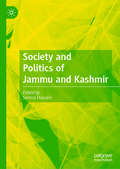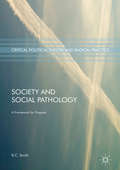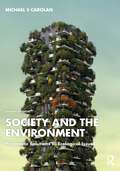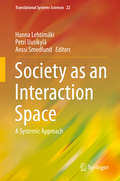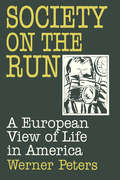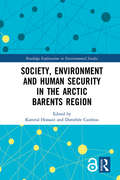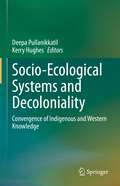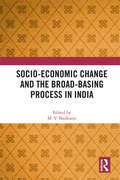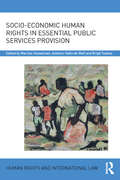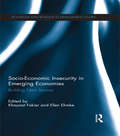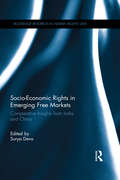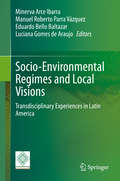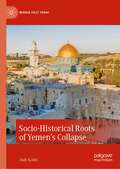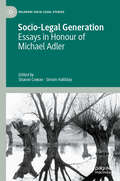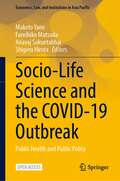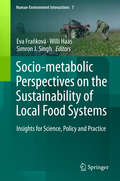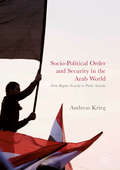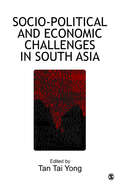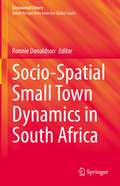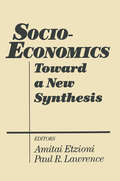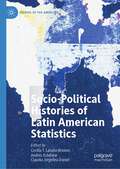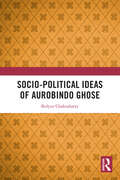- Table View
- List View
Society and Politics of Jammu and Kashmir
by Serena HussainKashmir is one of the longest-standing conflicts yet to be resolved by the international community. In 2000, Bill Clinton declared it the most dangerous place in the world and since then the situation continues to escalate. Positioned between India, Pakistan and China – three nuclear powers – Kashmir is the most militarized zone on the planet. Against this backdrop, the urgency to understand what Jammu and Kashmir means to those who actually belong to its territory has increased. This book not only helps readers navigate subtleties in a complex part of the world but is the first of its kind – written for a global audience from local perspectives, which to date have been sorely lacking.
Society and Social Pathology: A Framework for Progress (Critical Political Theory and Radical Practice)
by R. C. SmithThis book offers one of the most comprehensive studies of social pathology to date, following a cross-disciplinary and methodologically innovative approach. It is written for anyone concerned with understanding current social conditions, individual health, and how we might begin to collectively conceive of a more reconciled postcapitalist world.Drawing reference from the most up-to-date studies, Smith crosses disciplinary boundaries from cognitive science and anthropology to critical theory, systems theory and psychology. Opening with an empirical account of numerous interlinked carises from mental health to the physiological effects of environmental pollution, Smith argues that mainstream sociological theories of pathology are deeply inadequate. Smith introduces an alternative critical conception of pathology that drills to the core of how and why society is deeply ailing. The book concludes with a detailed account of why a progressive and critical vision of social change requires a “holistic view” of individual and societal transformation. Such a view is grounded in the awareness that a sustainable transition to postcapitalism is ultimately a many-sided (social, individual, and structural) healing process.
Society and the Environment
by Michael CarolanTalking about global environmental issues need not be an exercise in gloom, doom, and individual sacrifice--as Michael Carolan ably demonstrates in this introduction to environmental sociology. Society and the Environment examines today's environmental controversies within a socio-organizational context. After outlining the contours of "pragmatic environmentalism," Carolan explores the material world: air, water, biodiversity, and trash. He considers the pressures that exist where ecology and society collide, such as population growth and its associated increased demands for food and energy. Finally, he drills into the social/structural dynamics--including political economy and the international legal system--that create ongoing momentum for environmental ills. This interdisciplinary text features a three-part structure in each chapter that covers "fast facts" about the issue at hand, examines its wide-ranging implications, and offers pragmatic consideration of possible real-world solutions. Bolstering the analysis, a variety of boxes highlight relevant case studies as well as the value judgments which lurk everywhere in talk about environmental phenomena. Discussion questions and key terms enhance the text's usefulness, making Society and the Environment the perfect learning tool for courses on environmental sociology.
Society and the Environment: Pragmatic Solutions to Ecological Issues
by Michael S CarolanThe fourth edition of Society and the Environment centers its discussion on realistic solutions to the problems that persist and examines current controversies within a socio‑organizational context, shifting focus away from simply explaining what is wrong with the world around us. Introducing this “pragmatic environmentalism,” Carolan discusses the complex pressures and variables that exist where ecology and society collide, with population growth, the increase in demands for food and energy, and transportation and its outsized influence on urban and community patterns. With further attention given to the social phenomena and structural dynamics driving today’s environmental problems, the book concludes with an important reflection on truly sustainable solutions and what constitutes meaningful social change.Each chapter in this interdisciplinary text follows a three‑part structure beginning with an overview of what is wrong and why. This leads into a discussion on each issue’s wide‑ranging implications and, finally, a balanced consideration of realistic solutions. Featuring updated and expanded examples, discussion points, and coverage of recent developments, including the US withdrawing from the Paris Agreement, “booming” national economies and wealth distribution, growing global interest in environmental justice—with particular focus on the links between injustice and race and inequality—climate change, and renewable energy, this new edition remains an essential companion for courses on environmental sociology and sustainability.
Society as an Interaction Space: A Systemic Approach (Translational Systems Sciences #22)
by Anssi Smedlund Hanna Lehtimäki Petri UusikyläAs digitalization and social media are increasingly blurring the boundaries between traditional societal, political, and economic institutions, this book provides a cross-disciplinary examination of value co-creation. From various standpoints, it examines how institutions contribute to service ecosystems and how digitalization is transforming value co-creation in these ecosystems. Further, the book shares new perspectives on relational dynamics among government, companies, and citizens. These insights fill the gaps between service science and political science by integrating institutional logics into the concept of value co-creation. The book subsequently examines society as an interaction space. Topics discussed include the new logic and transformation mechanisms of economic activities, citizen participation, governance, and policy-making in the face of technological innovations, market-based reforms, and the risk of disconnect between citizens and policy-making. Here the focus is on value co-creation in complex adaptive systems where institutions, individuals, and businesses negotiate value and interests in networked relations. In closing, the book presents a range of empirical case studies on value co-creation, which provide examples of active networked citizenship, innovative governance and policy-making, democratic leadership, and trust-building dialogue among institutions. The studies address the context of Nordic countries, recognized as world-leading democracies. Pursuing a systems approach, the book articulates a social reality composed of interacting and interconnected elements that cannot be captured with only micro or macro levels of analysis. Service ecosystems are considered as configurations of people and technologies embedded in institutionalized rules, cultural meanings, and practices, offering valuable insights into the service-centered view of markets and society. Given the breadth and depth of its coverage, the book offers a valuable resource for all students and scholars interested in understanding and envisioning the future democratic landscape.
Society for New Testament Studies: Innocent Blood and the End of Exile (Society for New Testament Studies Monograph Series #167)
by Hamilton Catherine SiderIn this book, Catherine Sider Hamilton introduces a new lens through which to view the death of Jesus in Matthew. Using the concept of 'innocent blood', she situates the death of Jesus within a paradigm of purity and pollution, one that was central in the Hebrew Scriptures and early Judaism from the Second Temple to the rabbis. Hamilton traces the theme of innocent blood in Matthew's narrative in relation to two Jewish traditions of interpretation, one (in Second Temple literature) reflecting on the story of Cain and Abel; the other (chiefly in rabbinic literature) on the blood of Zechariah. 'Innocent blood' yields a vision that resists the dichotomies (intra muros vs extra muros, rejection vs redemption) that have characterized the debate, a vision in which both judgment and redemption - an end of exile - may be true. 'Innocent blood' offers a new approach not only to the meaning of Jesus' death in Matthew but also to the vexed question of the Gospel's attitude toward contemporary Judaism.
Society on the Run: A European View of Life in America
by W. PetersA study of the United States and its political culture. The author contends that democracy exists at the level of political institutions and processes in the US as well as in its private sector.
Society, Environment and Human Security in the Arctic Barents Region (Routledge Explorations in Environmental Studies)
by Kamrul Hossain Dorothée CambouThe Arctic-Barents Region is facing numerous pressures from a variety of sources, including the effect of environmental changes and extractive industrial developments. The threats arising out of these pressures result in human security challenges. This book analyses the formation, and promotion, of societal security within the context of the Arctic-Barents Region. It applies the human security framework, which has increasingly gained currency at the UN level since 1994 (UNDP), as a tool to provide answers to many questions that face the Barents population today. The study explores human security dimensions such as environmental security, economic security, health, food, water, energy, communities, political security and digital security in order to assess the current challenges that the Barents population experiences today or may encounter in the future. In doing so, the book develops a comprehensive analysis of vulnerabilities, challenges and needs in the Barents Region and provides recommendations for new strategies to tackle insecurity and improve the wellbeing of both indigenous and local communities. This book will be a valuable tool for academics, policy-makers and students interested in environmental and human security, sustainable development, environmental studies and the Arctic and Barents Region in particular.
Socio-Ecological Systems and Decoloniality: Convergence of Indigenous and Western Knowledge
by Deepa Pullanikkatil Kerry HughesThis contributed volume provides case studies from around the world that feature a convergence of indigenous and western knowledge in an attempt to understand complex socio-ecological systems. The book provides an understanding of socio-ecological systems in an ethical space using a 'Decoloniality' approach (i.e. untangling the production of knowledge from a primarily Eurocentric episteme). The work presented here integrates and merges indigenous knowledge with western science, thereby building on the strengths of each in service of understanding these systems. The editors of this volume approach indigenous communities and scientists as equal knowledge-holders and, in doing so, contributes towards improved understanding of socio-ecological systems and interactions in cross-cultural contexts. This volume will be of interest to scientists, instructors, students and policy makers across disciplines such as environmental sciences, social sciences, interdisciplinary studies, cultural studies, ethnobotany, anthropology and plant genetic resources.
Socio-Economic Change and the Broad-Basing Process in India
by M. V. NadkarniThis book offers a new concept of inclusion of the marginalised in India — the Broad-basing Process. The author examines how through this process increasing numbers of marginalised social groups can enter into the social, political and economic mainstream and progressively derive the same advantages from society as the groups already part of it. The book critically reviews how the broad-basing process has worked in the past in India both before and after its independence. It examines how social groups like Dalits, OBCs, Muslims, women and the labour class have fared, and how far economic development, urbanisation, infrastructure development and the digital revolution have helped the marginalised and promoted broad-basing. It also offers mechanisms to speed up broad-basing in poorer economies. A first of its kind, this volume will be useful for scholars and researchers of political studies, sociology, exclusion studies, political economy and also for general readers.
Socio-Economic Human Rights in Essential Public Services Provision (Human Rights and International Law)
by Brigit Toebes Marlies Hesselman Antenor Hallo de WolfThere is a clear overlap between securing socio-economic human rights for all persons and arranging adequate access to essential public services across society. Both are necessary to realise thriving, inclusive societies, with adequate living standards for all, based on human dignity. This edited volume brings together the two topics for the first time. In particular, it identifies the common challenges for essential public services provision and socio-economic human rights realisation, and it explores how socio-economic rights law can be harnessed to reinforce better access to services. An important aim of this book is to understand how international socio-economic human rights law and guideposts can be used and strengthened to improve access to services, and assess socio-economic legal and policy decisions. The volume includes contributions from different continents, on a range of different services, and engages with the realities of different regulatory settings. After an introduction that sets out the most important challenges for universal access to services – including sufficient resources mobilisation, private actor involvement and regulation, or the need for improved checks and balances – the book goes on to discuss current issues in services provision and socio-economic rights, as well as explores the place and role of private business actors in the provision of services. In particular, it assesses how the responsibility and accountability of such actors for human rights can be improved . The final part of the book narrows in on the under-explored human rights concepts of ‘participation’ and ‘accountability’, as essential prerequisites for better ‘checks and balances’. Overall, this volume presents a unique and powerful illustration of how socio-economic human rights law supports improved access to essential public services for all.
Socio-Economic Insecurity in Emerging Economies: Building new spaces (Routledge Explorations in Development Studies)
by Khayaat Fakier Ellen EhmkeTaking a unique comparative approach to the respective development paths of India, Brazil and South Africa (IBSA), this book shows that people and governments in all three countries are faced with similar challenges of heightened insecurity, caused by liberalization and structural adjustment. The ways in which governments, as well as individuals and worker organisations in IBSA have responded to these challenges are at the core of this book. The book explores the nature of insecurity in the Global South; the nature of the responses to this insecurity on public and small-scale collective as well as individual level; the potential of these responses to be more than neo-liberal mechanisms to govern and contain the poor and lessons to be learnt from these three countries. The first section covers livelihood strategies in urban and rural areas as individual and small-scale collective response to the condition of insecurity. Insecurity in the countries of the South is characterised by a high degree of uncertainty of the availability of income opportunities. The second section looks at state responses to insecurity and contributions on social protection measures taken by the respective IBSA governments. The third section discusses whether alternative development paths can be identified. The aim is to move beyond ‘denunciatory analysis.’ Livelihood strategies as well as public policies in some of the cases allow for the building of new spaces for agency and contestation of a neo-liberal mainstream which provide emerging and experimental examples. The book develops new thinking on Northern welfare states and their declining trade unions. It argues that these concepts, knowledge and policy innovations are now travelling in three directions, from North to South, from South to North, and between Southern countries. This book provides unique insights for researchers and postgraduate students in development studies, social policy and industrial sociology.
Socio-Economic Rights in Emerging Free Markets: Comparative Insights from India and China (Routledge Research in Human Rights Law)
by Surya DevaIn the last decade or so, China and India have emerged on the global stage as two powerful free market economies. The tremendous economic growth in China and India has meant that they have been able to lift millions of people out of the poverty trap. This growth has not, however, been without problems. Apart from worrying levels of environmental pollution, a significant number of people are still struggling to live a decent life as they do not have adequate access to basic needs such as food, health services, education, water, and housing. The traditional old age support mechanism is collapsing amidst push for urbanisation and the practice of nuclear families, while the alternative social security system has not been put in place. Both China and India stress the importance of socio-economic rights, have ratified the International Covenant on Economic, Social and Cultural Rights and have in place a strong legal framework for the realisation of such rights. The constitutions of China and India accord significant importance to socio-economic rights and the both countries have numerous laws, regulations and policies that seek to implement various socio-economic rights. This book investigates how the gradual adoption of free market ideology has impacted on the realisation of socio-economic rights in both India and China and how the constitutional and legal frameworks have made necessary adjustments. Chapters in this volume, which are written by academics of international standing, explore how these two countries have tried to overcome certain common governance challenges in realising socio-economic rights. The role played by courts in India and China in the protection and realisation of socio-economic rights is considered along with the use and limitations of public interest litigation in achieving these rights. Finally, the effectiveness of measures in realising socio-economic rights are evaluated in relation to specific rights such as the rights to food, health, education, social security, and gender equality.
Socio-Economic Rights in South Africa
by Malcolm Langford Malcolm Langford Ben Cousins Jackie Dugard Tshepo Madlingozi Ben Cousins Jackie DugardThe embrace of socio-economic rights in South Africa has featured prominently in scholarship on constitution making, legal jurisprudence, and social mobilization. But the development has attracted critics who claim that this turn to rights has not generated social transformation in practice. This book sets out to assess one part of the puzzle and asks what has been the role and impact of socio-economic strategies used by civil society actors. Focusing on a range of socio-economic rights and national trends in law and political economy, the book's authors show how socio-economic rights have influenced the development of civil society discourse and action. The evidence suggests that some strategies have achieved material and political impact but this is conditional on the nature of the claim, degree of mobilization and alliance building, and underlying constraints.
Socio-Environmental Regimes and Local Visions: Transdisciplinary Experiences in Latin America
by Minerva Arce Ibarra Manuel Roberto Parra Vázquez Eduardo Bello Baltazar Luciana Gomes de AraujoThis book presents oral histories, collective dialogues, and analyses of rural and indigenous livelihoods facing global socio-environmental regime change in Latin America (LA). Since the late twentieth century, rural and indigenous producers in LA, including agriculturists, coffee-growers, as well as small-scale farmers/fishers, and others, have had to resist, cope with, or adapt to a range of neoliberal socio-environmental regimes that impact their territories and associated resources, including water, production systems and ultimately their cultural traditions. In response, rural producers are using local visions and innovation niches to decide what, when, and how to resist, cope with uncertainty, and still be successful in using their customary laws to retain their land rights and livelihoods.This book presents a range of ethnically diverse case studies from LA, which addresses socio-environmental, educational, and law regimes’ effects using transdisciplinary research approaches in rural, traditional and indigenous production systems. Based on both, the results and insights gained into how producers are resisting and adapting to these regimes, as well as decades of research carried out in LA rural territories by the participating authors, the book puts forward a baseline for devising new public policies that are better suited to the real challenges of livelihoods, poverty, and environmental degradation in LA. These recommendations are rooted in post-development thinking; they promote territorial public policy with social inclusion and a human’s rights approach. The book draws on over 20 years of research carried out by LA’s academics and their undergraduate and graduate students who have addressed collaborative work, participatory research, and transdisciplinary approaches with rural commons and communities in LA. It features 19 case studies, with contributions from Argentina, Bolivia, Brazil, Colombia, Cuba, Honduras, and Mexico.
Socio-Historical Roots of Yemen’s Collapse (Middle East Today)
by Jude KadriThe book dives into the socio-historical roots of the current ‘disintegration’ of the Yemeni state, proposing that it is the result of a long process of devaluation of the Yemeni economy through imperialistic means, in the historical era of Advanced American imperialism—starting in the 1970s—that is facing the rise of China since the 1980s. As the United States feels threatened by the blossoming of Chinese influence on the Red Sea and the strategic maritime straits of Hormuz and Bab-el-Mandeb, it is of utmost importance to understand the centrality of the war on Yemen. The disintegration of the Yemeni state since 2015, involving the disintegration of Yemeni sovereignty (in part through the fragmentation of the country), is a means of creating political chaos in a strategic country. The goal is to limit the growth of Chinese influence in the region of the Arab world, which threatens the financial superstructure of the global economic system based on the US dollar.
Socio-Legal Generation: Essays in Honour of Michael Adler (Palgrave Socio-Legal Studies)
by Simon Halliday Sharon CowanThis book honors the diverse and path-breaking work of Michael Adler, a pioneer of socio-legal scholarship in the UK. The book brings together an international group of scholars—established and emerging researchers from across the globe—to develop key ideas generated by Adler’s scholarship. Building on his rich portfolio of creative work at the interface of law and social science, the book explores themes that continue to resonate in contemporary debates about how best to understand the relationship between justice, fairness, and the modern administrative state. Specifically, the book re-examines core issues which Adler, as a key figure of the first generation of UK socio-legal scholars, explored, including: the relationship between official discretion and the rule of law; the justice of internal administrative processes; the importance of a ‘bottom up’ perspective on justice; power and accountability in the prison sector; access to justice for social welfare claimants; and the promise of viewing law through the lens of social science.
Socio-Life Science and the COVID-19 Outbreak: Public Health and Public Policy (Economics, Law, and Institutions in Asia Pacific)
by Makoto Yano Fumihiko Matsuda Anavaj Sakuntabhai Shigeru HirotaThis open access book presents the first step towards building socio-life science, a field of science investigating humans in such a way that both social and life-scientific factors are integrated. Because humans are both living and social creatures, a human action can never be understood fully without knowing both the biological traits of a person and the social scientific environments in which he exists. With this consideration, the editors of this book have initiated a research project promoting a deeper and more integrated understanding of human behavior and human health. This book aims to show what can, and could be, achieved through our interdisciplinary project. One important product is the newly formed three-party collaboration between Pasteur Institut, Kyoto University, and the Research Institute of Economy, Trade and Industry. Covering many different fields, including medicine, epidemiology, anthropology, economics, sociology, demography, geography, and policy, researchers in these institutes, and many others, present their studies on the COVID-19 pandemic. Although based on different methodologies, the studies show the importance of behavioral change and governmental policy in the fight against a huge pandemic. The book explains the unique genome cohort–panel data that the project builds to study social and life scientific aspects of humans.
Socio-Metabolic Perspectives on the Sustainability of Local Food Systems: Insights for Science, Policy and Practice (Human-Environment Interactions #7)
by Eva Fraňková Willi Haas Simron J. SinghThis book delves into diverse local food systems and critically assesses their ecological and societal benefits and trade-offs, their limits and opportunities for improving sustainability of food production, and framework conditions which either hinder or promote their development. More and more people with gradually meat heavier diets will demand growth in food production, whilst our increasingly industrialized and globalized agri-food system has already caused serious sustainability problems in the past. This calls for a change in the way we produce, distribute and consume food. A re-emerging debate on food security and food sovereignty seems to support this quest. But what are the promising alternatives to mainstream developments? Such a discussion regarding sustainability of local food systems requires a sound systemic understanding and thus invites a socio-metabolic reading of local cases by analyzing the nexus between material and energy flows as well as land and time use. This approach is needed to complement the so far mostly qualitatively-based local food studies. Applying socio-metabolic approaches to local food systems fosters a better understanding of promises and pitfalls for sustainable pathways in the future.
Socio-Political Order and Security in the Arab World
by Andreas KriegThis book examines the connection between socio-politics and security in the Arab World. In an effort to understand the social and political developments that have been on-going in the Arab World since the 1990s, culminating in the Arab Spring, Krieg moves beyond liberal deterministic assumptions - most notably that the promotion of liberal values and democracy are the panacea for the structural problems of the region. Instead, this text advances the case that grievances related to individual security needs are at the heart of regional insecurity and instability. Looking towards the future, the author asserts that regimes can only be resilient if they are able to provide for individual security inclusively. When regimes fail to cater for public security, they might be replaced by alternative non-state security providers.
Socio-Political and Economic Challenges in South Asia
by Tan Tai YongThis book is a compilation of well researched papers that examine the evolving economic, political and social landscape of South Asia. While celebrating the economic and political growth of the countries of the region, it also highlights the challenges that they are likely to face in the coming years, such as the domestic strife in Sri Lanka, Nepal, Bangladesh and Pakistan and the region′s external relations with key global players like East Asia and the United States. Socio-Political and Economic Challenges in South Asia brings together some of the best minds to provide fresh insights. On a micro-level, it engages with various issues related to South Asian countries such as the domestic policies of Nepal with respect to Maoists, caretaker governments of Bangladesh, the strategic and security implications of the July 2005 India-United States Civilian Nuclear Cooperation Agreement, etc. On a macro-level, it explores South Asia′s external relations with key global players such as East Asia and the United States, and how this in turn influences the relations among the countries of the region. The book will be of great relevance to public servants dealing with domestic issues, as well as foreign policy officials and scholars working on South Asia politics.
Socio-Spatial Small Town Dynamics in South Africa (GeoJournal Library)
by Ronnie DonaldsonThis book explores small town geographical aspects by approaching them from a socio-spatial perspective. The contributions included in this book delve into a range of topics that have not been commonly studied before, such as white privilege, neglect of municipal infrastructure, collaborative governance, livelihoods in small-scale fisheries, housing provision, well-being in mining towns, studentification in rural contexts, election trends, and the historical development of small-town spas. The book adopts a socio-spatial point of view, providing a holistic understanding of the interplay between social and spatial factors within selected small town case studies. This approach sheds light on the socio-economic, political, and cultural dynamics that shape small towns. This localized perspective allows for a more targeted analysis of issues and potential solutions, taking into account the specific historical, cultural, and political contexts of small town South Africa. The edited volume serves as a valuable resource for academics, policymakers, practitioners, and anyone interested in understanding and improving small towns in South Africa.
Socio-economics: Toward a New Synthesis (Ethical Economy Ser.)
by Amitai Etzioni Paul R. LawrenceThis work is organized in seven sections around major themes of socio-economics. The first section outlines socio-economics in an historical perspective, drawing on the "Methodenstreit" in the German school of economics at the turn of the century. Four additional essays view economic behaviour from the perspective of psychology, sociology and values outside the realm of economics. The second section of the book explores the process of choice and goals made by the variety of economic factors, among them factors that influence choices, values and motivations outside economics. The next two sections, each containing three papers, examine executive leadership and entrepreneurship from the broader socio-economic perspective. Section five includes papers that deal with the role of institutions in the modern political economy. It develops an institutional theory of markets, firms, human values in economic behaviour and investment in ethnic goals and morality. Section six focuses on the modern corporate culture considering collective human capital. The final three papers examine the boundaries that embrace the processes and activities of firms. They consider the bonds and relationships that develop between firms and organizations in the modern political economy.
Socio-political Histories of Latin American Statistics (Studies of the Americas)
by Cecilia T. Lanata-Briones Andrés Estefane Claudia Jorgelina DanielThis book brings together recent research on the sociopolitical history of Latin American statistics from the nineteenth to the first half of the twentieth century. Reflecting the influence of social constructivism in the social sciences, it sheds new light on the historical emergence and development of both statistical reasoning and practices within a region traditionally seen as a passive consumer of foreign-produced theories and methods. By analysing the processes of institutionalisation of statistics in different national spaces, from Mexico to the Southern Cone, these studies show the unique ways in which Latin America adapted and used this modern tool of government and social classification to build political regimes and scientific arenas. The early enthusiasm for enumerating reality, the regular production of statistics and censuses, and the role of the region in the global transformation of this knowledge are some of the aspects reviewed to grasp the contingent dynamic of these dialogues and appropriations. Thus, Socio-political Histories of Latin American Statistics seeks to offer new insights into the divergent regional trajectories of this discipline, advancing towards an understanding of statistics and its past from a truly global perspective.
Socio-political Ideas of Aurobindo Ghose
by Bidyut ChakrabartyBy focusing on the socio-political ideas of the nationalist Aurobindo Ghosh (1872-1950), the book is an analytical dissection of his ideational vision which is still a relatively under-studied area of nationalist thoughts. During the perod, 1893-1910, Ghosh radically altered the texture of Indian nationalism by dwelling on how nationalism flourished in different parts of India, particularly, Japan, Italy and Ireland. conceptually different from the prevalent form of nationalist voice, it was he who clearly charted out a new course for anti-British campaign that fully unfolded with the appearance of Gandhi (1869-1948) on the Indian political scene. So, Aurobindo's politico-ideological vision ushered in a new era in the nationalist battle for India's political emancipation. Not only is the book therefore an intervention in the nationalist thought, but also devised new conceptual parameters for comprehending the radicalization of politico-ideological voices while simultaneously mobilizing those who were ready to make supreme sacrifices for the cause.
